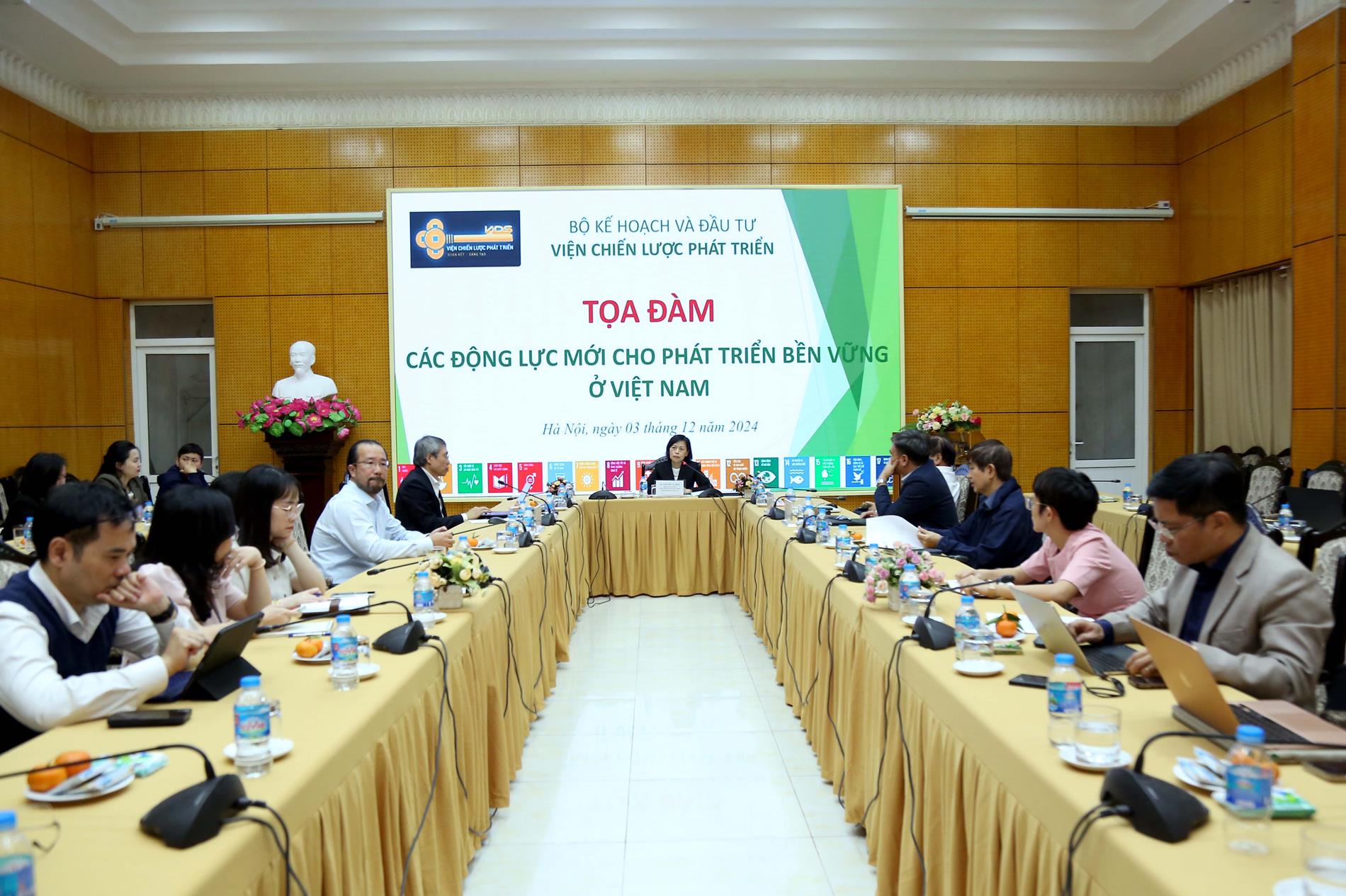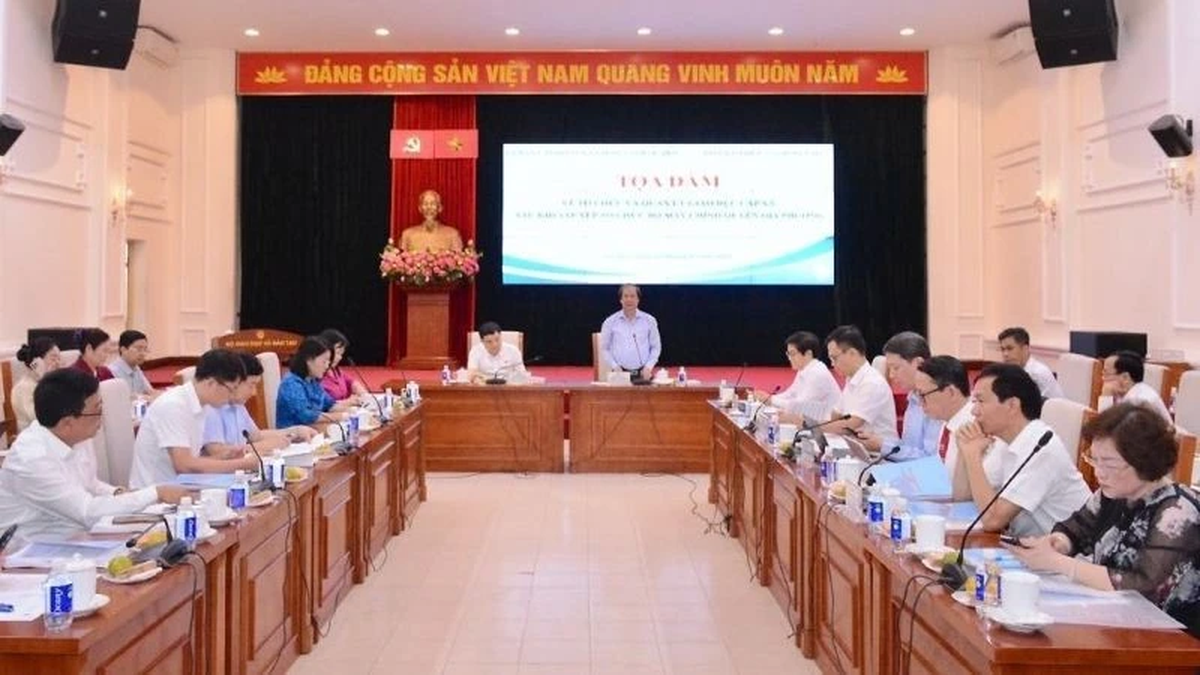(MPI) – On December 3, 2024, the Institute of Development Strategy, Ministry of Planning and Investment organized the Seminar “New driving forces for sustainable development in Vietnam” to create a forum for policy makers, researchers, and experts to discuss the implementation of sustainable development in Vietnam in recent times, analyze new driving forces for sustainable development in Vietnam in the coming time, as well as solutions to effectively promote new driving forces, contributing to the implementation of the country's sustainable development goals.
 |
| Overview of the Seminar. Photo: MPI |
In her opening speech, Ms. Nguyen Le Thuy, Deputy Director of the Institute for Development Strategy, Ministry of Planning and Investment, said that sustainable development is an inevitable trend and a strategic choice of countries around the world. It is also the consistent orientation in the development process of Vietnam. In recent years, with strong efforts and determination, Vietnam has achieved many positive results in implementing the Sustainable Development Goals (SDGs). The results of the 2023 Voluntary National Review ( VNR ) show that the implementation of SDG goals in Vietnam has achieved positive results in a number of areas such as hunger eradication and poverty reduction, child care and protection, social protection, general education, higher education, access to electricity, etc. The multidimensional poverty rate decreased from 9.2% in 2016 to about 3.2% in 2023. The Human Development Index (HDI) increased from 0.689 in 2016 to 0.726 in 2022, making Vietnam a country with a high HDI index since 2019. According to the United Nations Sustainable Development Report 2023, Vietnam ranked 55/166 countries; in Southeast Asia, Vietnam is assessed quite well in terms of overall progress in implementing the sustainable development goals, ranking 2nd after Thailand. In 2023, Vietnam's GDP will reach more than 430 billion USD, making it the 35th largest economy in the world. With a high economic growth rate over the past two decades, Vietnam strives to reach upper middle income by 2030 and become a developed, high-income country by 2045.
Although Vietnam has made remarkable progress in achieving some SDG targets, the implementation of the SDGs still faces many difficulties and challenges. Vietnam still has limitations in inequality, health care and social security. Vietnam's growth in recent times has put great pressure on the environment. The impacts of climate change are becoming more severe. External impacts and internal constraints have been and are holding back Vietnam's growth and the implementation of the SDGs in the long term. In the current context of increasing geopolitical competition and economic instability, Vietnam is facing many greater development challenges, including enhancing economic resilience and addressing climate risks.
In order to achieve the SDG targets by 2030 and fulfill the commitment to net zero emissions by 2050, Vietnam needs appropriate policies and solutions. Exploiting and maximizing new drivers for growth and sustainable development such as circular economy, energy transition, carbon market development, etc. are both urgent and strategic issues for Vietnam in the period from now to 2030 and the following years.
Converting energy from fossil fuels to clean, renewable energy is an opportunity for Vietnam to promote growth model innovation, restructure the economy towards sustainability, enhance economic competitiveness and take advantage of trade and investment cooperation opportunities for development. Energy transition will promote research on new technologies, create more green jobs, contribute to reducing carbon emissions, and promote sustainable development. Increasing pressure from strict environmental regulations of developed countries is urging Vietnamese businesses to participate more strongly in energy transition and emission reduction.
Overviewing the implementation of sustainable development in Vietnam, Dr. Nguyen Van Thuat, Head of the Department of Sustainable Development Strategy and Environment, Institute of Development Strategy, presented the results and limitations in implementing a number of sustainable development goals. Accordingly, sustainable development in our country has achieved many significant achievements in economic, social and environmental aspects. However, challenges and difficulties remain great. In the coming time, in order for sustainable development to achieve greater achievements, there must be breakthrough and synchronous solutions, one of the solution orientations that need to be mentioned is to improve the capacity of state management in economic, social and environmental aspects and take the quality of policy formulation and implementation as the key and central point; Consider promoting innovation, green transformation, energy transformation, digital transformation and strengthening communication work for people in building and spreading a green lifestyle - harmony between nature, people and society as both a method, content and key driving force for sustainable development.
Sharing at the seminar on developing the carbon market for green transformation and sustainable development, Ms. To Nguyen Cam Anh, Deputy Director of the Legal Department, Ministry of Finance, said that developing the carbon market is an important solution to achieve the goal of reducing greenhouse gas emissions at a reasonable cost. To create carbon credits, businesses must practice sustainable development (ESG) and are required to have emissions and emission reduction reports. Developing the carbon market will promote the development and application of low-emission technologies, contributing to improving the competitiveness of businesses towards developing a low-carbon economy, proactively responding to climate change and sustainable development.
At the Seminar, delegates exchanged and discussed issues of circular economy creating momentum for sustainable development of the country or creating momentum for sustainable development from energy transition. Circular economy brings great benefits in saving resources, protecting the environment and promoting sustainable economic growth. The transition to circular economy is a great opportunity for Vietnam to develop rapidly and sustainably, not only achieving economic, social, environmental goals, responding to climate change, but also helping to achieve SDGs by 2030./.
Source: https://www.mpi.gov.vn/portal/Pages/2024-12-4/Toa-dam-Cac-dong-luc-moi-cho-phat-trien-ben-vung-oc17esh.aspx



































































































Comment (0)